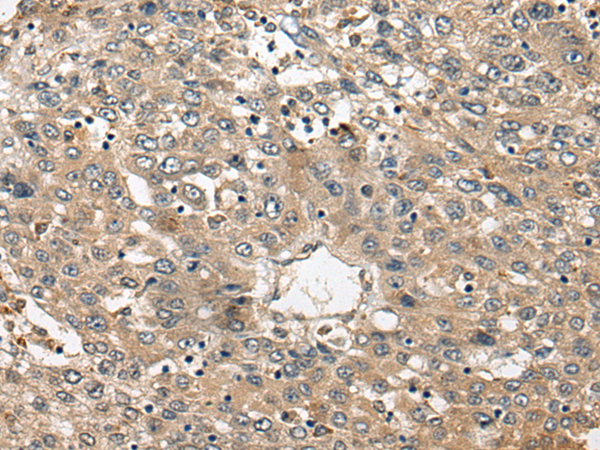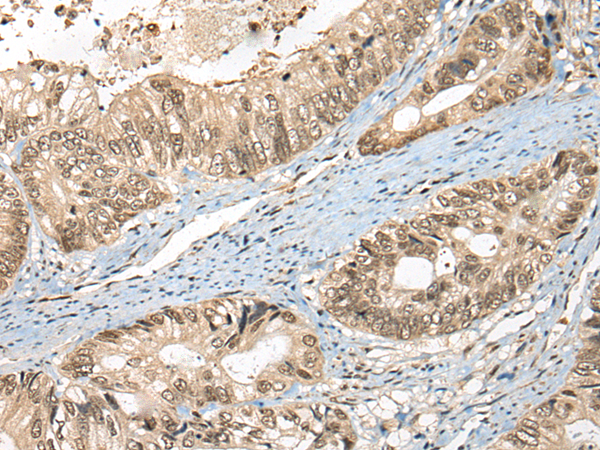

| WB | 咨询技术 | Human,Mouse,Rat |
| IF | 咨询技术 | Human,Mouse,Rat |
| IHC | 1/30-1/150 | Human,Mouse,Rat |
| ICC | 技术咨询 | Human,Mouse,Rat |
| FCM | 咨询技术 | Human,Mouse,Rat |
| Elisa | 1/5000-1/10000 | Human,Mouse,Rat |
| Aliases | LeX; CD15; ELFT; FCT3A; FUTIV; SSEA-1; FUC-TIV |
| Host/Isotype | Rabbit IgG |
| Antibody Type | Primary antibody |
| Storage | Store at 4°C short term. Aliquot and store at -20°C long term. Avoid freeze/thaw cycles. |
| Species Reactivity | Human |
| Immunogen | Synthetic peptide of human FUT4 |
| Formulation | Purified antibody in PBS with 0.05% sodium azide and 50% glycerol. |
+ +
以下是3篇关于FUT4抗体的模拟参考文献示例(注:内容为虚构概括,实际文献请通过PubMed/Google Scholar检索确认):
---
1. **文献名称**:*FUT4-mediated glycosylation in breast cancer stem cells promotes tumorigenesis*
**作者**:Zhang Y, et al.
**摘要**:研究利用FUT4特异性抗体阻断肿瘤干细胞表面Lewis X抗原合成,发现可显著抑制乳腺癌细胞的自我更新和转移能力,提示FUT4抗体在靶向治疗中的潜在价值。
2. **文献名称**:*FUT4 regulates neutrophil adhesion via PSGL-1 glycosylation in inflammatory responses*
**作者**:Li H, et al.
**摘要**:通过FUT4抗体抑制实验,证实FUT4介导的岩藻糖基化修饰影响中性粒细胞与内皮细胞的黏附,为调控过度炎症反应提供了新靶点。
3. **文献名称**:*Monoclonal antibody against FUT4 suppresses colorectal cancer progression by blocking EGFR signaling*
**作者**:Wang X, et al.
**摘要**:开发了一种新型FUT4单克隆抗体,证明其可通过干扰EGFR的糖基化修饰抑制结直肠癌细胞增殖,并在小鼠模型中显著降低肿瘤负荷。
---
如需具体文献,建议访问PubMed(https://pubmed.ncbi.nlm.nih.gov)并搜索关键词“FUT4 antibody”或“FUT4 function”获取最新研究。
FUT4 antibody targets the FUT4 enzyme, also known as α-(1.3)-fucosyltransferase 4. a member of the glycosyltransferase family. This enzyme catalyzes the transfer of fucose to glycoconjugates, playing a key role in synthesizing cell surface carbohydrates like Lewis antigens (e.g., Lewis X and sialyl Lewis X). These structures are critical for cell-cell adhesion, immune recognition, and signal transduction. FUT4 is highly expressed in specific tissues, including the brain, digestive tract, and leukocytes, and is implicated in physiological processes such as embryogenesis and inflammation.
Dysregulated FUT4 activity is linked to pathological conditions. Overexpression of FUT4 has been observed in cancers (e.g., breast, colon, and lung), where it promotes tumor metastasis by enhancing cell adhesion and invasiveness. It also contributes to chronic inflammatory diseases by facilitating leukocyte-endothelial interactions.
FUT4 antibodies are essential tools in research, enabling the detection and localization of FUT4 in tissues or cells via techniques like immunohistochemistry, flow cytometry, and Western blot. These antibodies help elucidate the role of FUT4 in disease mechanisms, particularly its involvement in abnormal glycosylation patterns associated with malignancy and inflammation. Additionally, they support the development of therapeutic strategies targeting carbohydrate-mediated pathways.
In summary, FUT4 antibodies provide insights into the enzyme’s biological functions and its pathological significance, making them valuable in both basic research and clinical applications.
×